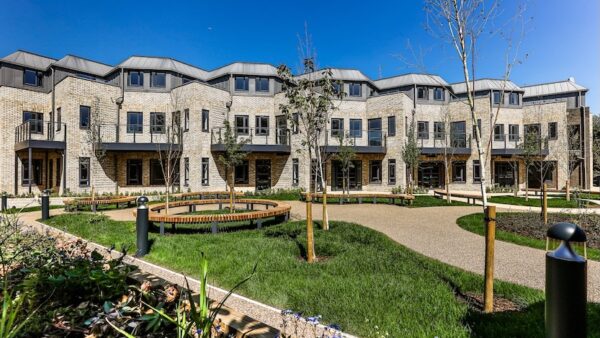A social enterprise set up to manufacture low carbon thermal and acoustic insulation from recycled cotton had its product installed in a 2014 Winter Olympic Games broadcasting centre in Sochi.
Its product, Inno-Therm, is an eco-insulation made from recycled cotton and denim waste which is collected, sorted and produced in France by RI’s parent company Le Relais. Several years in development, the firm claims its product uses 70% less energy in production than the equivalent conventional inorganic insulation.
This is not a paywall. Registration allows us to enhance your experience across Construction Management and ensure we deliver you quality editorial content.
Registering also means you can manage your own CPDs, comments, newsletter sign-ups and privacy settings.
Inno-Therm was used as acoustic protection in the US broadcaster NBC’s HQ during the London 2012 Olympic Games before being shipped to Sochi for re-use during the Winter games.
Previous projects the product has been used in include the South Yorkshire Energy Centre in Sheffield, by Allen Tod Architecture; Anns Grove Primary School, Sheffield, by architect White Design; and the Genesis eco building at Somerset College of Design & Technology, designed by Architype.
The product has also been chosen by Kevin McCloud as one of his eight “Green Heroes”, innovative eco-friendly products due to be exhibited at Grand Designs London, staged at Excel in May.
Inno-Therm comprises roughly 80% cotton and 20% polyester and is treated to prevent the growth of bacteria, mould fungus and moths.
The product contains no chemical irritants and has a thermal conductivity, when dry, of 0.039W/m2K. It behaves like a hydro regulator, absorbing and releasing water vapour, and has a fire resistance of Euroclass E (or Euroclass B/S1/d0 under gypsum board). It has a sound absorption coefficient of 0.95 and acoustic fading is 42dB with a density of roughly 45kg/m3 and a thermal conductivity when dry of 0.044 W/mK.
For every square metre of insulation sold, RI donates a percentage to Solar-Active to support renewable energy, fuel and money-saving activities in schools and community projects.
Internal wall training scheme wins award
A joint CITB and Saint-Gobain training scheme for internal wall insulation won a Retro Expo award in December.
The Internal Wall Insulation Standard Upskilling Programme, developed by CITB with British Gypsum, a subsidiary of Saint-Gobain, was set up to provide installers with a standard vocational qualification proving their ability to complete internal wall insulation work to the latest sustainable standards.
The NVQ-based training is delivered by British Gypsum’s Technical Academy team and meets the requirements of Route 1 and 2 of PAS 2030, the standard for installing, managing and providing energy efficiency measures in existing buildings under the Green Deal and the Energy Company Obligation (ECO). It also won a Green Deal training award at the Association of Interior Specialists Awards.
The course is suitable for existing tradesmen and contractors, or site supervisory staff and merchant personnel and is designed to increase knowledge of customer needs in meeting Building Regulations and identifying solutions, as well as offering guidance on installing British Gypsum products and systems.
TSB-funded demonstration project to research solid wall insulation in 1950s homes
A demonstration project funded by the Technology Strategy Board aims to improve the efficiency and cost of retrofitting insulation in solid walled homes, also creating new commercial products and services in the process.
The S-IMPLER project (Solid Wall Innovative Insulation and Monitoring Processes using Lean Energy Efficient Retrofit) is a three-year collaboration between the BRE, Carillion Energy Services, the Northern Ireland Housing Executive (NIHE) and other partners.
It will aim to achieve a 60% reduction in monitored energy costs in 1950s solid wall homes, and demonstrate how retrofit work can be completed faster and with less disruption than today’s techniques. The S-IMPLER trial will concentrate on seven 1950s NIHE demonstration homes, and the results are expected to benefit many of the UK’s 6.9m solid wall homes.
The project will implement a range of innovations and collaborative techniques, including a new surveying tool developed by VRM Technology, and a BIM tool developed by the University of Salford, which will allow clients to model different cost and benefit options.
BRE associate director Ross Helleron told CM: “The survey tool is being led by VRM which has an advanced iPad application that simplifies both the physical surveying process and will draw in supplier and installer specific costs. The output will be a detailed bill of quantities for the main contractor and property owner.
“In addition, a whole house monitoring system developed by Tensor Systems will assess real energy performance and Leeds Metropolitan University will conduct more detailed analysis of the fabric performance of the retrofitted homes.”














